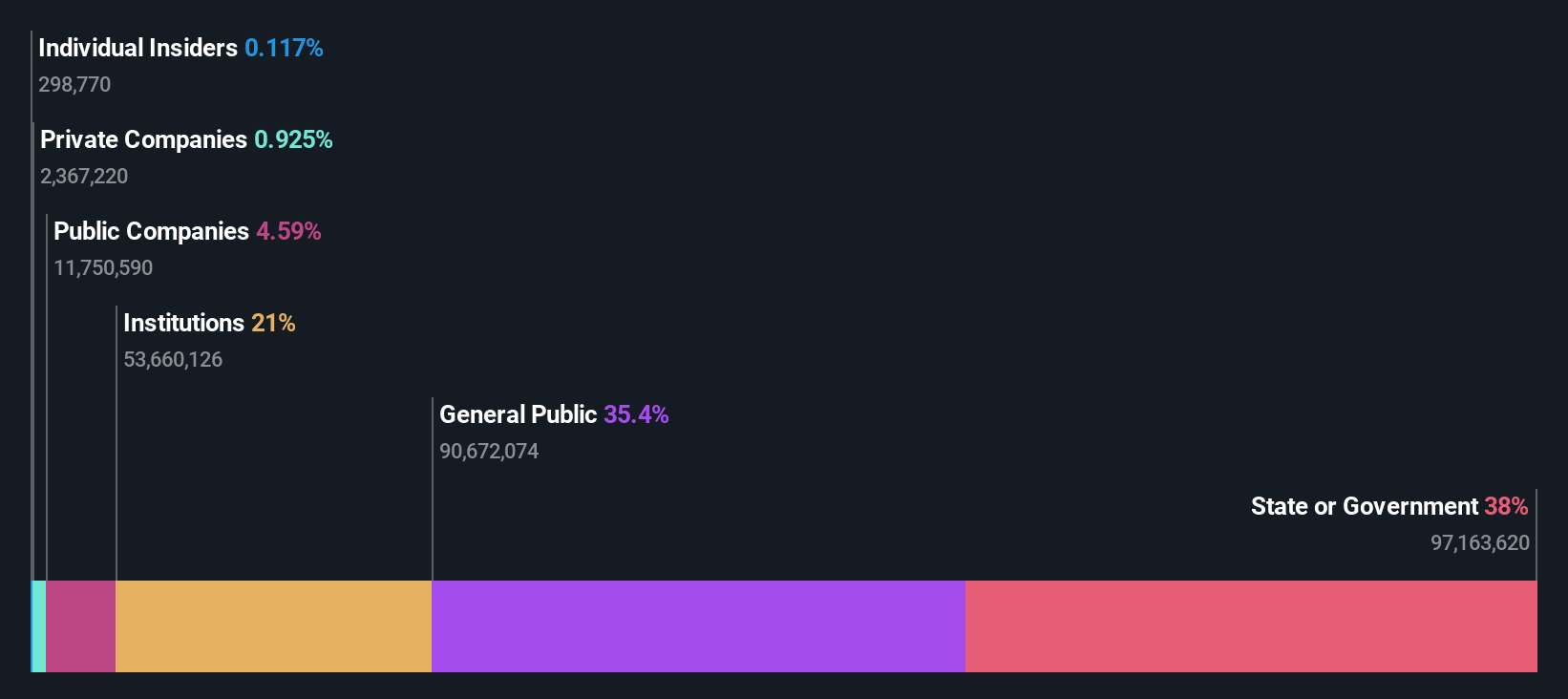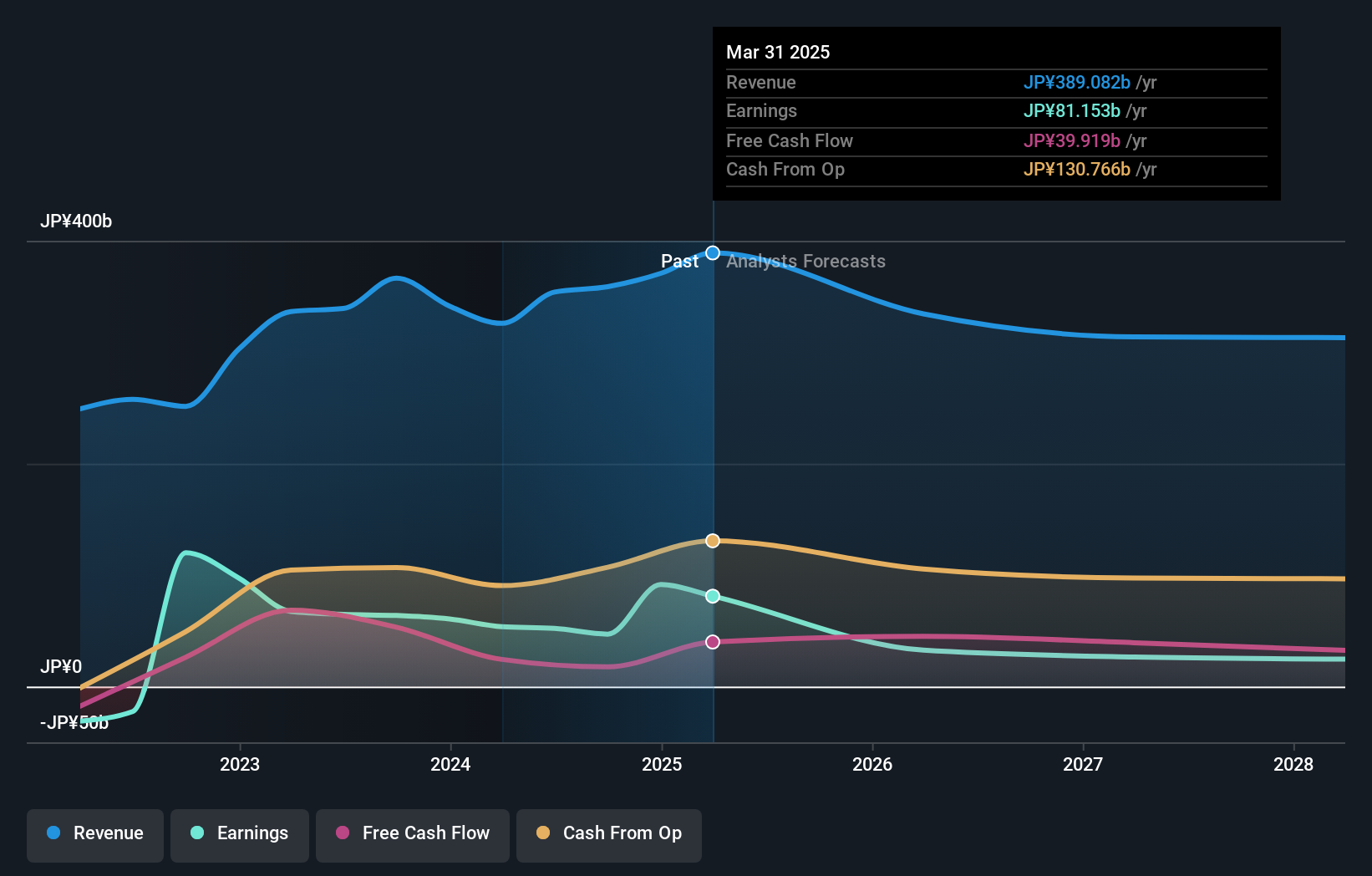Key Insights
Trump has pledged to “unleash” American oil and gas and these 15 US stocks have developments that are poised to benefit.
To get a sense of who is truly in control of Japan Petroleum Exploration Co., Ltd. (TSE:1662), it is important to understand the ownership structure of the business. The group holding the most number of shares in the company, around 38% to be precise, is state or government. Put another way, the group faces the maximum upside potential (or downside risk).
As a result, state or government collectively scored the highest last week as the company hit JP¥283b market cap following a 3.6% gain in the stock.
Let’s take a closer look to see what the different types of shareholders can tell us about Japan Petroleum Exploration.
See our latest analysis for Japan Petroleum Exploration
 TSE:1662 Ownership Breakdown August 2nd 2025 What Does The Institutional Ownership Tell Us About Japan Petroleum Exploration?
TSE:1662 Ownership Breakdown August 2nd 2025 What Does The Institutional Ownership Tell Us About Japan Petroleum Exploration?
Institutions typically measure themselves against a benchmark when reporting to their own investors, so they often become more enthusiastic about a stock once it’s included in a major index. We would expect most companies to have some institutions on the register, especially if they are growing.
We can see that Japan Petroleum Exploration does have institutional investors; and they hold a good portion of the company’s stock. This can indicate that the company has a certain degree of credibility in the investment community. However, it is best to be wary of relying on the supposed validation that comes with institutional investors. They too, get it wrong sometimes. When multiple institutions own a stock, there’s always a risk that they are in a ‘crowded trade’. When such a trade goes wrong, multiple parties may compete to sell stock fast. This risk is higher in a company without a history of growth. You can see Japan Petroleum Exploration’s historic earnings and revenue below, but keep in mind there’s always more to the story.
 TSE:1662 Earnings and Revenue Growth August 2nd 2025
TSE:1662 Earnings and Revenue Growth August 2nd 2025
Hedge funds don’t have many shares in Japan Petroleum Exploration. Ministry of Economy, Trade and Industry is currently the company’s largest shareholder with 38% of shares outstanding. With 5.2% and 2.8% of the shares outstanding respectively, Orbis Investment Management Limited and Inpex Corporation are the second and third largest shareholders.
On looking further, we found that 50% of the shares are owned by the top 5 shareholders. In other words, these shareholders have a meaningful say in the decisions of the company.
While studying institutional ownership for a company can add value to your research, it is also a good practice to research analyst recommendations to get a deeper understand of a stock’s expected performance. There are a reasonable number of analysts covering the stock, so it might be useful to find out their aggregate view on the future.
Insider Ownership Of Japan Petroleum Exploration
While the precise definition of an insider can be subjective, almost everyone considers board members to be insiders. The company management answer to the board and the latter should represent the interests of shareholders. Notably, sometimes top-level managers are on the board themselves.
Most consider insider ownership a positive because it can indicate the board is well aligned with other shareholders. However, on some occasions too much power is concentrated within this group.
Our data suggests that insiders own under 1% of Japan Petroleum Exploration Co., Ltd. in their own names. It’s a big company, so even a small proportional interest can create alignment between the board and shareholders. In this case insiders own JP¥331m worth of shares. It is good to see board members owning shares, but it might be worth checking if those insiders have been buying.
General Public Ownership
The general public, who are usually individual investors, hold a 35% stake in Japan Petroleum Exploration. While this size of ownership may not be enough to sway a policy decision in their favour, they can still make a collective impact on company policies.
Public Company Ownership
Public companies currently own 4.6% of Japan Petroleum Exploration stock. It’s hard to say for sure but this suggests they have entwined business interests. This might be a strategic stake, so it’s worth watching this space for changes in ownership.
Next Steps:
I find it very interesting to look at who exactly owns a company. But to truly gain insight, we need to consider other information, too. For example, we’ve discovered 3 warning signs for Japan Petroleum Exploration (1 makes us a bit uncomfortable!) that you should be aware of before investing here.
But ultimately it is the future, not the past, that will determine how well the owners of this business will do. Therefore we think it advisable to take a look at this free report showing whether analysts are predicting a brighter future.
NB: Figures in this article are calculated using data from the last twelve months, which refer to the 12-month period ending on the last date of the month the financial statement is dated. This may not be consistent with full year annual report figures.
New: Manage All Your Stock Portfolios in One Place
We’ve created the ultimate portfolio companion for stock investors, and it’s free.
• Connect an unlimited number of Portfolios and see your total in one currency
• Be alerted to new Warning Signs or Risks via email or mobile
• Track the Fair Value of your stocks
Try a Demo Portfolio for Free
Have feedback on this article? Concerned about the content? Get in touch with us directly. Alternatively, email editorial-team (at) simplywallst.com.
This article by Simply Wall St is general in nature. We provide commentary based on historical data and analyst forecasts only using an unbiased methodology and our articles are not intended to be financial advice. It does not constitute a recommendation to buy or sell any stock, and does not take account of your objectives, or your financial situation. We aim to bring you long-term focused analysis driven by fundamental data. Note that our analysis may not factor in the latest price-sensitive company announcements or qualitative material. Simply Wall St has no position in any stocks mentioned.


AloJapan.com